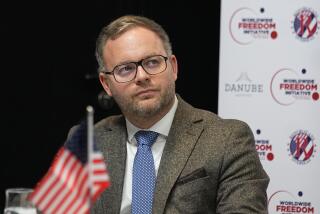Hungarian Premier Who Executed ’56 Rebels Dies
- Share via
BUDAPEST, Hungary — Janos Kadar, who took power after the Soviets crushed the 1956 revolt and led Hungary for 32 years until moderates forced him out during hard times, died today. He was 77.
Kadar’s death of pneumonia and circulatory problems came as the Supreme Court canceled all charges against former Premier Imre Nagy and his associates, who led the 1956 uprising and were executed under Kadar on charges of high treason.
The state-run MTI news agency said the Communist Party had “with profound sorrow” informed its members and the Hungarian people of “Comrade” Kadar’s death.
MTI said funeral arrangements will be announced later. It is unlikely that he will be buried before President Bush’s visit next week.
Hungarian television broadcast a half-hour documentary on his life this morning, and two Budapest radio stations canceled all rock ‘n’ roll music and light entertainment.
Since he was replaced by Karoly Grosz in 1988 as party general secretary, Kadar’s political legacy has come under fierce attack and the Communists have moved rapidly to embrace democratic change.
Kadar will perhaps be most remembered for his 1962 statement to a rally in the industrial town of Csepel: “Those who are not against us are with us.”
By the mid-1980s, Hungary’s economy was plunging and the Soviet Union was undergoing a political rebirth under Mikhail S. Gorbachev. Kadar fell out of favor in ruling circles.
In a published response May 10 that MTI said was Kadar’s last public statement, the former leader admitted “mistakes” but said: “My actions were guided by good intentions.”
In apparent reference to the 1958 execution of Nagy and hundreds of others after the 1956 revolt, Kadar said in the letter, “I hope . . . that future generations will assess more objectively the results and errors of the past 30 years.”
Kadar’s change in fortunes was typical of a long career that began in 1931 when he joined the illegal Communist Party as a 19-year-old from a peasant background.
Kadar was jailed and forgotten after a party purge in 1951 but was rehabilitated after the downfall of his Stalinist rival, Matyas Rakosi.
More to Read
Sign up for Essential California
The most important California stories and recommendations in your inbox every morning.
You may occasionally receive promotional content from the Los Angeles Times.












